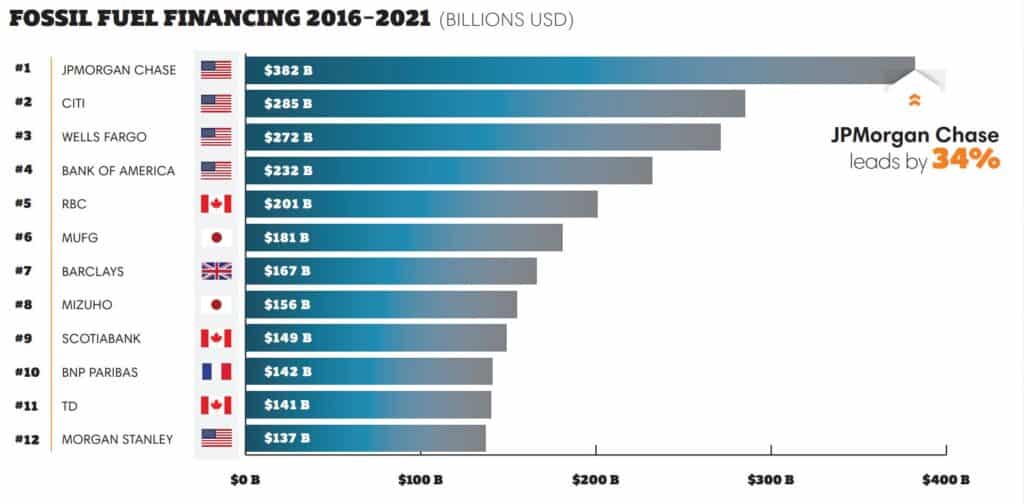Most of the world’s largest banks and asset managers are failing to put into action their climate goals.
Three major banks recently rejected shareholders’ proposals to align lending practices with climate targets while three more will do the same.
Shareholders of Citigroup, Wells Fargo, and Bank of America passed resolutions to end support for fossil fuels. A specific resolution from Citigroup shareholders proposed that the bank,
“…adopt proactive measures to ensure that the company’s lending and underwriting do not contribute to new fossil fuel supplies.”
It was denied the same with similar resolutions from the two other banks.
Banks’ Climate Goals Versus Actions
Banks have been pumping about $4.1 trillion of financing to the oil, gas, and coal sector via loans and bond sales since the Paris Agreement in 2015. $656 billion of that was for last year only.
The three major banks named have poured a total of $789 billion into fossil fuels from 2016 to 2021. $199 billion of that accounted for 2021 financing alone.
Worse is that Wells Fargo has the biggest fossil fuel funding increase from 2020 to 2021 ($20B more).
The chart below shows the banks supporting fossil fuels, with JP Morgan topping the list.
Shareholders of those banks demanded that they act according to their climate goals. This means taking actions in line with the banking sector’s net zero commitments.
Banks have to mirror the International Energy Agency’s Net Zero Emissions by 2050 and the G20 Sustainable Finance Working Group.
Also, all these financiers have signed up to the Glasgow Financial Alliance for Net Zero, or GFANZ. This alliance works to align banks, insurers, and asset managers with the goal of hitting net zero by 2050.
GFANZ covers two important net zero alliances in the financing sector.
- The Net Zero Asset Managers alliance
- The Net-Zero Banking Alliance.
Both commit to aligning lending and investment portfolios with net zero emissions.
But what occurred during the banks’ Annual General Meetings tells a different story.
Banks Denied Shareholders’ Desire to Embrace Climate Goals
Only 12.3% voted for Citi to adopt lending practices that are consistent with climate goals.
The same pattern emerged in Wells Fargo and Bank of America, with about 11% of votes for each bank.
Research from InfluenceMap also revealed similar climate change responses from the financial sector. Only 11 out of 30 largest traded financiers and banks even have reliable climate goals to cut emissions.
Likewise, Europe’s biggest banks gave $32 Billion (£24B) towards oil and gas company expansions.
A researcher noted that,
“There is a stark disconnect between what they [financing firms] say about climate change and what they’re actually doing.”
Climate advocates in the sector contended that it’s not enough to set a net zero target. What’s needed is a credible plan for achieving those targets as emphasized in the resolutions.
And the sure-fire way to that is to stop new fossil fuel expansion and new supply, immediately.
Yet, management from the three banks rejected such proposals focusing on climate goals.
Citi CEO Jane Fraser, for instance, opposed the resolution saying that,
“It’s not feasible for the global economy, for human health or livelihoods to shut down the fossil fuel economy overnight.”
Big Asset Managers and Bankers Are Not Supportive, Too
Blackrock, State Street, and Vanguard have also most likely voted quietly against the proposal. These big three asset managers are top shareholders in Citi, Wells Fargo, and Bank of America.
They also own about 20% of America’s 6 largest banks and 20% of the average company listed on the S&P 500 index.
JP Morgan Chase, Morgan Stanley, and Goldman Sachs are also expecting to face similar resolutions in the coming weeks. But speculations indicate that most shareholders are likely to reject them as well.
These giant financiers even lobbied the Securities and Exchange Commission to toss out the resolution. They argued that it will set inflexible and heavy restraints on their daily business.
While those biggest banks decide not to vote for climate goals, a few others have been pursuing measures that cut emissions.
And the votes for the resolutions calling on banks to pursue climate goals urgently say one clear thing.
That there’s a small yet notable number of Wall Street investors who want to do away with fossil fuels. In a figure, it’s accounted for $65 billion in capitalization.


